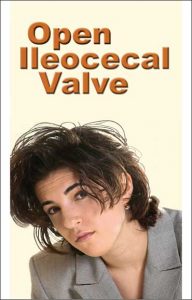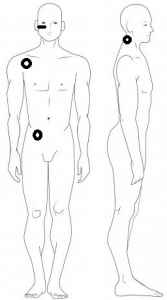Why Do I Have Digestive Problems?
by Michael D. Allen, DC, NMD
Functional Neurologist
Your digestive problems probably relate to a one-way valve located between your large and small intestine called your ileocecal valve (ICV). It is a sphincter valve that is designed to allow the contents of the small intestine to pass into your large intestine but to stop its back-flow into the  small intestine. The ICV separates waste matter from backing up into the areas meant for absorption.
small intestine. The ICV separates waste matter from backing up into the areas meant for absorption.
The Ileocecal Valve Syndrome
The ICV can function in one of three possible ways. It can either work properly or it can be stuck open or closed. When the ICV is stuck open, waste products from the large intestine can back up into your small intestine and disturb your digestion. An open ICV allows unhealthy toxins to be absorbed across the intestinal wall and into your body through your blood. It can also affect the timing of your stomach’s emptying. When the ICV is stuck closed, waste products are blocked from passing from the small intestine into the large intestine and that too can affect the way your stomach works. Either way, an ICV syndrome can cause big digestive problems.
Unfortunately, this disorder is often overlooked by many doctors who know nothing about it. An ICV syndrome can result in a combination of symptoms.
Ileocecal Valve Syndrome Symptoms:
- Right shoulder pain
- Right side pelvic pain
- Low back pain
- Pain around the heart
- Flu symptoms
- Tinnitus
- Nausea
- Syncope / Near syncope
- Headache
- Bad breath
- Face pallor
- Dark circles under the eyes
- Dizziness
- Blurred vision
Causes of Ileocecal Valve Syndrome:
- Not enough calcium
- Too much phosphorus
- Dehydration
- Emotional upsets (i.e., too much stress)
- How you eat (overeating, eating too frequently, eating too quickly, eating foods you are sensitive to, not chewing food well enough)
- Foods you eat (too much fiber, carbonated drinks, alcohol, caffeine, chocolate, raw foods, hot spicy foods, tiny seeds)
Treating Ileocecal Valve Syndrome
Treatment options for an ICV syndrome are chiropractic adjustments, applied kinesiology reflex points, and diet modifications.
Chiropractic Adjustments
A dysfunctional ileocecal valve indicates that the digestive system’s timing is out of sync. The ileocecal valve must be timed with the stomach in order to keep the contents of the intestines moving the right direction. Any timing error is a strong indication that the nerves that control the digestive processes need attention, and the best way to correct the problem is by adjusting the spine.
Applied Kinesiology Reflexes
There are four spots to rub that help close the ileocecal valve.  Rub each one for about 20-30 seconds and do a complete treatment at least three times daily. If you have digestive problems after you eat, rub them again. Any one or a combination of sore spots is like a red light on your body’s dashboard. If you saw a red light there it means that something needs attention right away. They are all on the right side.
Rub each one for about 20-30 seconds and do a complete treatment at least three times daily. If you have digestive problems after you eat, rub them again. Any one or a combination of sore spots is like a red light on your body’s dashboard. If you saw a red light there it means that something needs attention right away. They are all on the right side.
- Inside the right hip bone.
- Inside the right shoulder joint.
- Behind the middle of the neck on the right side.
- Squeeze the right cheek bone horizontally.
Dietary Modifications
For two to three weeks, absolutely avoid all of the following:
- Roughage foods*, such as: corn and popcorn, nuts, potato chips, pretzels, seeds, whole grains, berries
- Raw fruits and vegetables, such as: celery, bell peppers, cucumbers, cabbage, carrots, lettuce, tomatoes
- Spicy foods, such as: chili powder, hot peppers, salsas, black and cayenne pepper, paprika, cloves, cinnamon
- Other foods: dairy, soy, alcohol, cocoa, caffeine, chocolate, carbonated drinks
*Note: A low roughage diet is not recommended for the long term.
Some Additional Notes About the Ileocecal Valve
Digestion is one very important factor to good health. The digestive tract is where you absorb the building blocks for the cells in your body. The digestive tract also makes most of the neurotransmitters necessary for normal body processes, including nerve transmission. There are as many nerves in the digestive system as there is in the central nervous system, making it very important in immune function. Without proper digestive function everything else in your body will not work properly.
When the ICV is either stuck open or stuck closed, there is an imbalance in the digestive system that leads to other physiological problems. One is malabsorption, a problem where nutrients, vitamins and minerals are not being absorbed. You may be eating the right types of food packed with important nutrition, vitamins and minerals but you are not absorbing them. The same would be true with the nutritional supplements you may be taking; if they are not absorbed, they are literally going down the toilet. The old saying, You are what you eat is not true. The saying should be: You are what you eat, chew, digest, absorb and assimilate.
Another problem that can arise from the ICV malfunctions is toxicity. If the ICV is stuck closed, the food is sitting in your intestines too long while it continues to break down, and the contents will eventually start to rot and putrefy. The toxins have a high probability of being absorbed through the walls of the small intestine and going straight to your liver. Once there, these toxins have the probability of overloading the detoxification pathways that work to keep the intestines clean.
ICV problems can mimic many other problems, like: dizziness, pseudo bursitis, pseudo sacroiliac pain, faintness, allergy symptoms, pseudo sinus infection, pseudo hypochlorhydria (i.e., low hydrochloric acid), sudden thirst, pallor, bowel involvement and much more.
If you think you might have an ICV issue, give us a call today and we will get right to work to straighten the problem right out.



